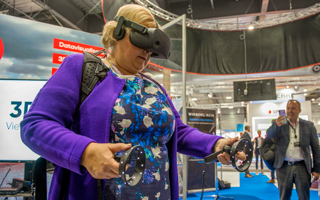From the News Desk: Change is inevitable, but details are missing
A round-up of the key themes from Nor-Shipping this week suggests that disruption looms for shipping’s squeezed middle and the trepid traditionalist, but even the most focused futurists need to learn agility to ride the oncoming wave of innovation and regulatory upheaval. Easy answers are not in ample supply right now.
Highlights from the Lloyd’s List News Desk this week include: Banks aligning lending to climate targets, decarbonisation requiring outside collaboration, robots vs regulators as autonomy advances and yet more forecasting of disruption being business as usual
Green finance will accelerate decarbonisation disruption
While banks have paid little more than lip service to the concept of green finance in the recent past when it comes to shipping, the tide is finally changing and that is going to affect everyone.
Conversations in Oslo this week at the Nor-Shipping events all point in the same direction — rapidly tightening restrictions from capital market lenders and banks linked to environmental, social and governance (ESG) targets will further squeeze available financing for smaller shipping companies and trigger another round of consolidation within the next two years.
The existing problems for banking remain — pressure is compounded by new regulations slapped on banks during the past few years that force them to set aside even more capital. And while banks, particularly European ones, have faced tighter regulatory scrutiny since the financial crisis and often cite that as a reason for a less generous lending policy in shipping, creating an ever more serious funding gap for the squeezed middle, environmental sustainability considerations are now expected to become a crucial factor in lending decisions as well.
Lloyd’s List revealed earlier this week that a group of leading banks will soon incorporate climate change considerations in their official lending policy. While this represents a seismic shift towards finance supporting the industry’s 2050 decarbonisation goals, it ultimately spells more trouble for the squeezed middle of shipping who will struggle to access funding as the industry stumbles towards a decarbonised future.
One way or the other capital is only going to flow in the direction of companies that are doing the right thing, but that’s going to cut out a lot of the current industry struggling to do their best.
Collaboration is key to most of shipping’s challenges

Nor-Shipping has, somewhat inevitably, been dominated by discussion of decarbonisation this year, but amid the tech-led innovation proposals and puff, a growing consensus of industry leaders is finally talking about cross-sector collaboration being the key to clean shipping.
“You can’t decouple shipping from how the rest of the economy is going to decarbonise,” explained class society Lloyd’s Register head of sustainability Katherine Palmer on this week’s Lloyd’s List podcast, which was recorded at Nor-Shipping in Oslo. “It’s about understanding the whole supply chain... We can’t do this on our own.”
Given that we have been banging this drum for some time now at Lloyd’s List, (you can read a few of suggested Ideas to Revolutionise Shipping here) this is at least a positive sign that a shift in mindset is finally taking hold, at least among the forward-thinking innovators who dominate the Nor-Shipping crowd.
For all the current focus on emissions, the real solutions lie in finding efficiencies well beyond the scope of the vessel and that requires collaboration with the cargo interests, banks, insurers — indeed the whole supply chain.
Robots vs regulators – the race towards autonomy may yet get mired in red tape

With news that Norway has successfully tested a remotely controlled ferry, autonomy was front and centre at Nor-Shipping as the industry’s tech-progressives agreed that the mantra from here on was ‘innovate or die’.
But while the researchers are confident that crewless vessels will be a reality imminently, the International Maritime Organization faces a lengthy process of agreeing rules to govern the development. Initial signals from the Maritime Safety Committee this week in London suggests diverging opinions between member states and non-governmental organisations will mean that regulatory solutions will be moving significantly slower than any engineering breakthroughs.
So while regulators settled in for a bureaucratic bun-fight over the nitty gritty of autonomous oversight, the Japanese are pressing ahead regardless.
Their view, coloured by a genuinely insightful analysis of the winners and losers of autonomy via the Nippon Foundation, concludes that crewless ships is not just an advantage – it is essential. Not least because Japan want to push robotics as one of the primary defences for its domestic industry to deal with anticipated labour shortages.
Technology is a tool, agility is an attitude

If you were looking for an over-arching conclusion from this week’s round of events, debates, political posturing and puff-powered pitches, it would be that change is inevitable, although details of the pace of change, its scale and scope, are missing right now.
Every prediction made by the traditional analysts is not only wrong, but wrong by several degrees of magnitude, Professor Ramez Naam, Adjunct Professor at Singularity University, told the crowds gathered at the opening session of Nor-Shipping. “Bet on the innovators, not on the forecasters,” was his message.
Predictably enough there was no shortage of such innovators on show at Nor-Shipping. In the light of all this transformation, we need to change the way we make decisions, offered Kongsberg chief Geir Håøy — a theme picked up more than once at the Lloyd’s List Innovation Forum this week.
It seems that everyone needs to go back to school, even the executives, because if the view from Nor-Shipping proves to be correct, then the innovators will rise to the top and the traditionalists will be left behind. It’s not technology we need to learn, it’s agility.

